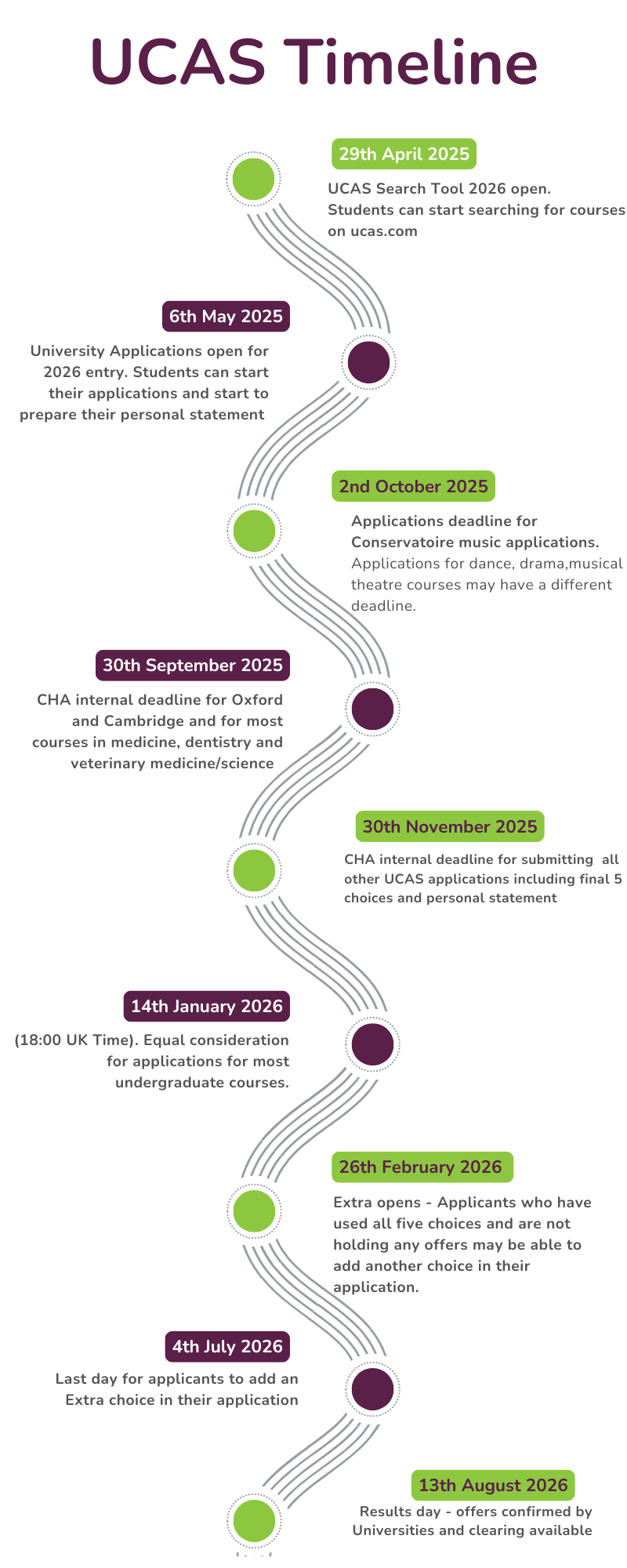UCAS Preparation & Oxbridge
As you start to think about the possibility of applying to University, we have put together some essential information to help with your application. This includes a walk though on how to apply though UCAS with our CHA Guide to UCAS Applications
2026 - Personal Statements are Changing
Find out about the changes by clicking here
Personal statements are changing from one longer piece of text to three separate sections, each with a different question to help shape the focus of students' answers. Each section will have a minimum character count of 350 characters, which is clearly labelled on the question boxes, along with an overall character counter, to ensure students know if they're on track. The new web page for submitting the personal statement will also feature helpful on-page guidance for each question.
The new questions are as follows:
- Why do you want to study this course or subject?
- How have your qualifications and studies helped you to prepare for this course or subject?
- What else have you done to prepare outside of education, and why are these experiences useful?
What isn't changing
- The personal statement will still be 4000 characters in total; this includes spaces.
- The content of the personal statement will remain broadly the same - it will just be split across three sections rather than one longer piece of text. The expectation for what students need to cover within the personal statement is mostly unchanged from current guidance.
We will be guiding students through the changes with a series of Personal Statement workshops in the summer term of 2025 and at the beginning of Year 13.
Super-curricular activities are going to be important - see information at the end of this page.
Guide to filling out your UCAS
We have prepared a useful step by step guide which will walk you though the UCAS application forms. Please read THE CHILTERN HILLS ACADEMY GUIDE TO UCAS APPLICATIONS before you start the process as includes the passwords you need to start the application as well as important advice.
Search for University Courses
Make sure you use the Unifrog University Tool to help you select which Universities to put on your UCAS form.
The Unifrog Subject Know-how Guide is really useful in helping you explore and decide on subjects and courses at University.
UCAS Information Evening
We host a UCAS Information Evening every Spring for students and parents where we explain Higher Education options and give support with Personal Statements. The key dates for UCAS are as follows.

How to ACE your Personal Statement
Unfrog has a wealth of information to help and guide you through your personal statement. Every student at Chiltern Hills Academy has their own Unifrog Subscription provided by the school. You can ace your Personal Statement by reading this from Unifrog and this from UCAS
Leicester University have also produced a Personal Statment Hub packed with advice, hints and tips and have even set up a Personal Statement group chat.
Here are some other useful guides you should read before starting your Personal Statement.
How to start your Personal Statement
How to end your Personal Statement
Personal Statement builder tool
How to structure your personal statement
Writing your personal statement
The Dos and Don'ts
Using AI or Chat GPT in your Personal Statement
Filling in your UCAS Application form
Create your shortlist of Universities with Unifrog

Applying to Oxbridge and Medical Universities
Each year we have students applying to Oxford or Cambridge or Medical School.
Unifrog has produced a student interview detailing her application process to Oxford here
Compare Oxford and Cambridge at a glance
Oxford University's guide for applicants.
Cambridge video for applicants below
UCAS have produced a useful guide, packed with advice on how write a personal statement for Medical School.
Some Overlooked Courses
Here are some courses that are often overlooked which may be worth considering.
UNIVERSITY OF EAST ANGLIA
UNIVERSITY OF GLOUCESTERSHIRE
GOLDSMITHS, UNIVERSITY OF LONDON
UNIVERSITY OF LEICESTER
LIVERPOOL HOPE UNIVERSITY
Super Curricular Enrichment - 10 things you can do
It is important you take part in Super Curricular activities to set you apart from other applicants. Please read this Guide to Super Curricular Activities detailing 10 things you can do.
Work experience and MOOCs are good ways to enhance your Personal Statement
The Sutton Trust
The Sutton Trust support young people from less advantaged backgrounds to access leading universities and careers. Social mobility is about ensuring the opportunities open to a young person are not dependent on the economic and social position they were born into. The Sutton Trust Programmes are completely free to attend, including travel, accommodation, food and activities.

